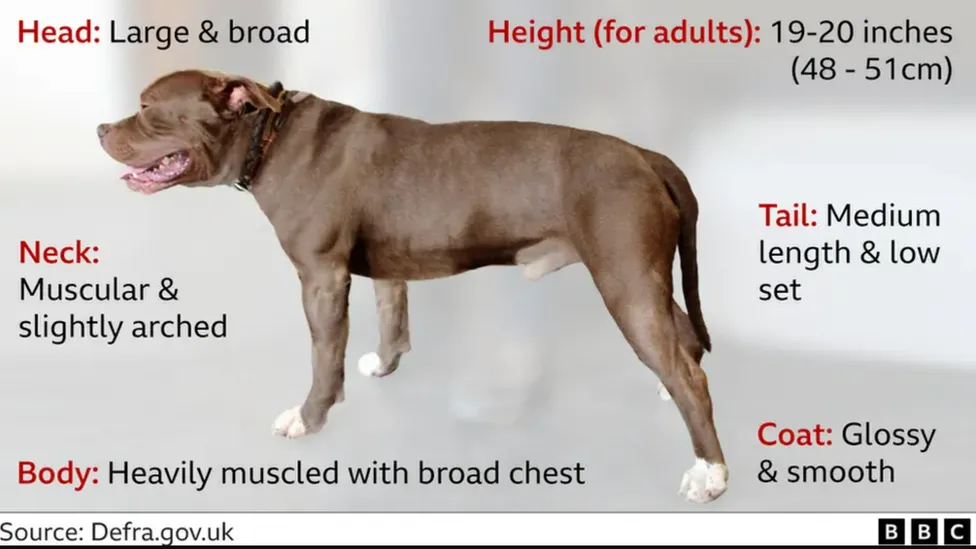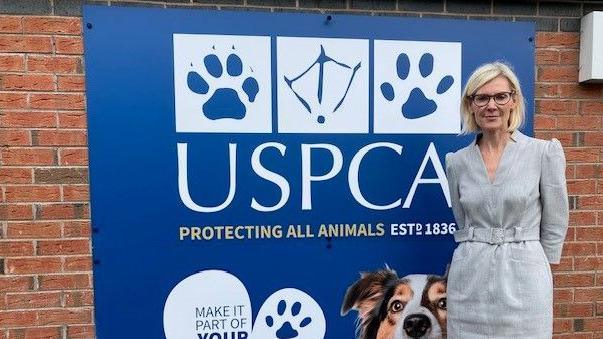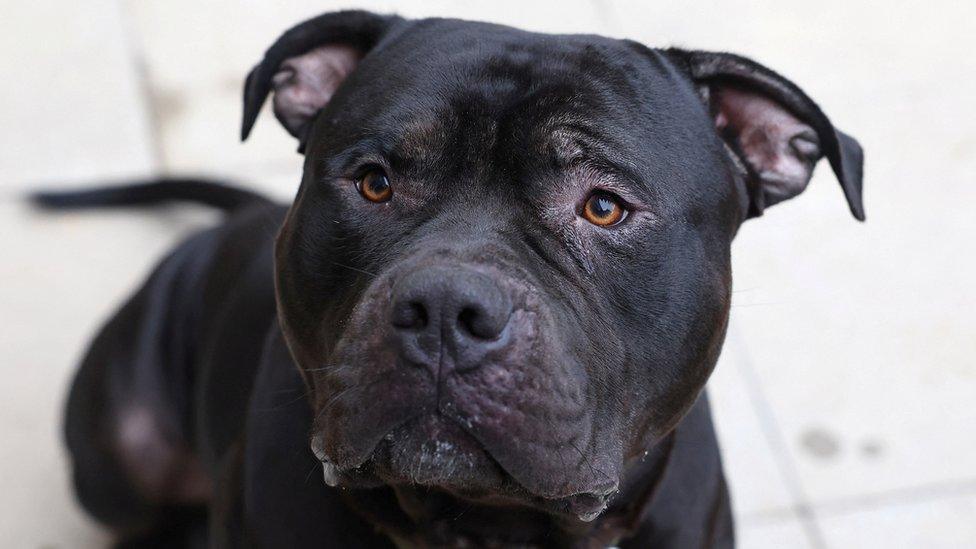'I don't want to have a centre full of XL Bullies'

Karen Matthews has been caring for Titan while they tried to rehome him
- Published
The owner of an animal shelter says she is concerned about new legislation that will ban the rehoming of XL bully dogs in Northern Ireland.
From Friday, the first stage of new legal safeguards come into force.
While it will remain legal to own an XL Bully dog, they must be muzzled and kept on a short lead in public places.
Karen Matthews, from Almost Home Animal Centre, says her team work to "rescue, not destroy" animals.
"The last thing I want is to have a centre full of XL Bullies and having to make that choice [to destroy]," she added.
The restrictions aimed at safeguarding people, livestock or any other animal from attacks by XL Bully dogs came into effect at midnight.
Selling, gifting, exchanging or breeding from an XL Bully dog is banned and rescue centres will also no longer be able to accept an XL Bully dog.
The Department of Agriculture, Environment and Rural Affairs (DAERA) Minister Andrew Muir said the restrictions are designed to protect the public and are proportionate.
He said it was the "best approach in this situation" following the recent fatal attacks attributed to XL Bully type dogs, one in London and another in Limerick.
The total number of dog attacks investigated in Northern Ireland's 11 councils for April 2023 to March 2024 is 1,581, according to DAERA.
XL Bully dogs are behind 48 of these attacks, with 30 of these resulting in injuries to persons or other animals.

Titan was transferred to the charity from a pound
Titan is 14 months old, he was a stray transferred to Almost Home in Moira three weeks ago from a pound in Londonderry.
"He's one of the least stressful dogs to walk. He doesn't pull," said Ms Matthews.
She says she doesn't know if Titan is an XL Bully type, but that he may fall into that category.
What is an XL Bully?

An XL bully is the largest kind of American bully dog.
The breed is a variant of the wider American Bully, according to guidance from the UK Department for Environment, Food and Rural Affairs, external.
Titan fits some of the criteria as set out, external by the UK government.
They are described as large dogs "with a muscular body and blocky head, suggesting great strength and power for [their] size".
Ownership of the XL bullies is subject to strict controls across the United Kingdom.
'Not a defined breed'
USPCA Chief Executive Nora Smith said one of the key criticisms of the legislation is that an XL Bully is "not a defined breed".
"The only binary characteristics they have are the height restrictions," she said.
"The government has set out this broad criteria.
"It's up to each XL Bully owner to decide whether or not they meet these broad characteristics."

Chief Executive of the USPCA, Nora Smith says the new legislation 'isn't the answer'
DAERA said when restrictions were brought into England and Wales in 2023 there were 91 XL Bully dogs licenced in Northern Ireland.
Since then the number has continued to rise and now sits at 196.
Ms Smith said public safety was a concern for the animal charity but this new legislation "just isn't the answer".
The USPCA is part of the Dog Control Coalition, along with the Kennel club, the British veterinary Association and other welfare groups who are calling on the Northern Ireland Executive and other authorities across the UK to take a more "nuanced approach to dog attacks".

Michael McCartney has been a dog trainer for over 40 years
Michael McCartney from Glen Craig Canine training in Lisburn has more than 40 years' experience working with dogs, including XL Bully types.
"A dog's a dog, it just depends who's on the other end of it," he said.
Mr McCartney added that he often had more bother with smaller breeds.
This new legislation is the first phase.
The second will come into effect from 31 December 2024.
From this date, it will be an offence to own an XL Bully type dog without an Exemption Certificate or having applied for an Exemption Certificate.
This means if an XL Bully type dog owner wishes to keep their dog they must apply and pay for an Exemption Certificate by that date.
The penalties for breach of the new safeguards, external are up to six months imprisonment and/or a fine up to £5,000.
Related topics
- Published6 June 2024

- Published24 March

- Published13 January 2024

- Published5 March 2024
